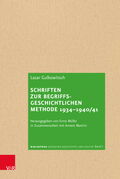
Lazar Gulkovich: Writings on the History of Concepts (Edition)
In 1937, Lazar Gulkovich published Zur Grundlegung einer begriffsgeschichtlichen Methode in der Sprachwissenschaft [On the Foundations of a Conceptual Historical Method in Linguistics], the first monograph ever to mention in its title the history of concepts. Gulkovich, born in 1898 in the Russian Empire near Novogrudok, was initially a student of Talmud. After his studies and doctorate in Königsberg, he lectured at Leipzig University until 1933 on the history of late Judaism. In exile in Tartu (Estonia) he held a chair for Jewish studies, the only one of its kind in Europe at the time. In 1941, Gulkovich was murdered by German troops in Tartu.
Conceptual history helped Gulkovich posit a seamless tradition of Judaism. According to him, the Jewish people demonstrated how a culture without a state develops. He substantiated his conceptual history in various works on the concept of Hāsid (the pious, the just), working on the thesis of a continuous development of the concept from the Old Testament to Eastern European Hasidism. His Jewish-influenced approach was related to non-Jewish conceptual history in several respects.
The 1930s marked a threshold for the development of conceptual history in various disciplines (Otto Brunner, Erich Rothacker, the Annales School, and Arthur O. Lovejoy’s Great Chain of Being). At the same time, several Jewish intellectuals (Karl Mannheim, Ludwik Fleck, Richard Koebner, Marc Bloch) drew far-reaching consequences from the historicity of concepts. But only Gulkovich consistently applied the history of concepts to Jewish intellectual and cultural history. In contrast to other contemporary scholars who emphasized the function of modernity as a threshold, he tried to show that there had been no rupture in Judaism. Almost simultaneous to the early research into Hasidism by Martin Buber, Simon Dubnow, and Gershom Scholem, Gulkovich worked on the history of Hasidism with an eye towards conceptual history. For him, Hasidism, which he saw as a phenomenon concerned with the spiritual and social but not with the state, developed—historically speaking—in the Sattelzeit (1750–1850) examined by Koselleck. Gulkovich understood himself as a philologist as well as a sociologist, who also tried to describe the change of register of terms (for example, Hāsid originated as a theological category but later became an ethical and social category).
At the center of the edition is Gulkovich’s On the Foundations of a Conceptual Historical Method in Linguistics. In addition, shorter texts or excerpts of other printed and unprinted materials are published in an appendix.
This editorial work, carried out in collaboration with Annett Martini (FU Berlin), was part of the project European Traditions – Encyclopedia of Jewish Cultures of the Saxon Academy of Sciences, directed by Dan Diner at the Leibniz Institute for Jewish History and Culture – Simon Dubnow in Leipzig. The volume was published in the series Bibliothek jüdischer Geschichte und Kultur.
Publications
in collaboration with Annett Martini
Lazar Gulkowitsch: Schriften zur begriffsgeschichtlichen Methode 1934–1940/41
Ernst Müller
- Lazar Gulkowitschs frühe Grundlegung der Begriffsgeschichte, in: ZfL Blog, 21 Dec 2022
- Latenz und Explikation: Lazar Gulkowitsch und seine Begriffsgeschichte des jüdischen Geistes, in: Yfaat Weiss (ed.): Jahrbuch des Simon-Dubnow-Instituts 17 (2018). Göttingen: Vandenhoeck & Ruprecht 2020, 517–538
- Pionier der Begriffsgeschichte: Die Sprache ist immer die letzte Zuflucht, in: Frankfurter Allgemeine Zeitung, 16 Jul 2017
